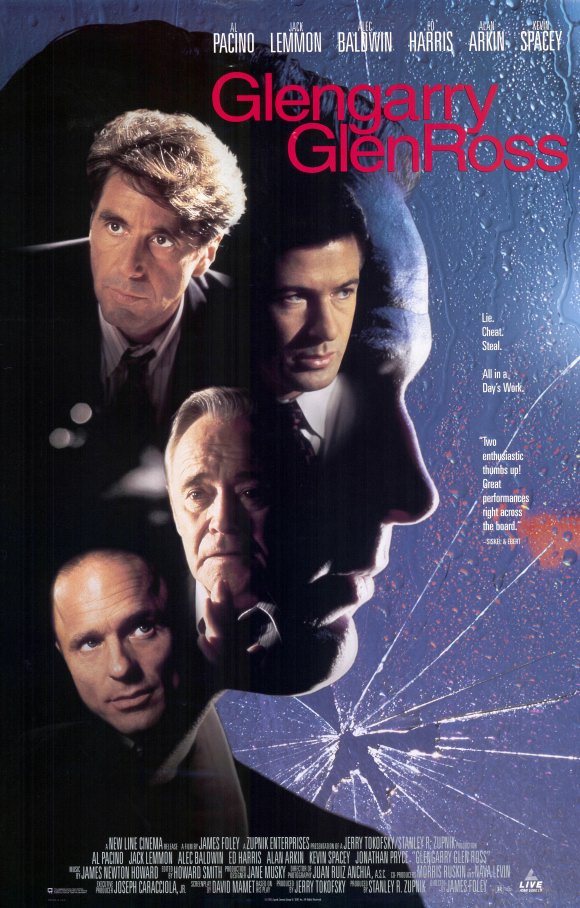
Glengarry Glen Ross (1992) Plot Summary
A group of desperate salesmen battle for survival in a high-stakes real estate competition in this gripping drama.

The Pressure to Perform
In a cutthroat Chicago real estate office, a group of salesmen operate under constant pressure. Their success is dictated by how many deals they close, using leads—names and contact details of potential buyers—supplied by the firm. These leads are the life source of their careers, but most are cold, offering little hope of an actual sale. Manager John Williamson is responsible for distributing the leads, and his rationing frustrates the salesmen, especially when it becomes clear that the best leads—the Glengarry Highlands prospects—are being withheld.
To reignite productivity, the firm sends Blake, a successful and ruthless salesman, to motivate the team. His approach is brutal. In a tirade filled with insults, he announces that only the top two closers for the month will keep their jobs. The rest will be fired. His speech sets the tone for what follows: desperation, manipulation, and betrayal.
Deals and Desperation
Among the team is Shelley “The Machine” Levene, a veteran salesman who has hit a dry streak. Once at the top, Levene now struggles to close even the weakest deal. Complicating matters is his daughter’s hospitalization, a burden he quietly carries. Hoping to reverse his luck, Levene pleads with Williamson for access to the premium Glengarry leads. Williamson offers to sell them for cash, but Levene, already stretched thin, cannot pay.
Meanwhile, Dave Moss, another frustrated salesman, complains about the firm’s unfair practices to George Aaronow, a quieter and more reserved colleague. Moss proposes a drastic solution: the Glengarry leads should be stolen and sold to a competing real estate firm. He pressures Aaronow to carry out the break-in, arguing that knowledge of the plan already makes him an accomplice. Aaronow resists, but the suggestion leaves a mark.
In contrast to the turmoil, Richard Roma, the office’s top performer, is shown working a potential client named James Lingk. Roma’s method is subtle and psychological. Rather than selling property, he sells a dream, appealing to Lingk’s insecurities and need for control. A deal is made, and Roma celebrates another successful close.
A Crime Discovered
The following morning, chaos grips the office. A burglary has occurred overnight. The Glengarry leads are missing. Police are brought in, and each salesman is questioned. Williamson assures Roma that the contract from his Lingk deal was not taken, but suspicions begin to swirl.
During the interrogation, Moss loses his temper and storms out after a heated argument with Roma. Tension escalates when Lingk arrives unexpectedly, accompanied by the weight of his wife’s disapproval. He demands to cancel the purchase. Roma tries to confuse and reassure him, claiming the payment hasn’t yet been processed. However, Williamson, unaware of Roma’s tactic, contradicts him. Lingk, now convinced he’s been tricked, leaves the office shaken. Roma, furious over the ruined deal, lashes out at Williamson.
Truth Revealed
Levene, riding high on what he believes is a successful sale from earlier that day, joins the commotion. He, too, criticizes Williamson for his incompetence. However, a slip in Levene’s words catches Williamson’s attention. He realizes that Levene could only have known about the status of the Lingk check by having seen it on Williamson’s desk—something only possible if Levene had entered the office during the break-in.
Cornered by the realization, Levene confesses. The leads were taken and sold to a rival firm, with Moss orchestrating the plan and Levene assisting in exchange for a cut. Desperate to avoid arrest, Levene offers a bribe: a share of his commission. But Williamson reveals that Levene’s recent sale was worthless. The clients were delusional and financially incapable. There is no commission.
Even when Levene appeals to Williamson’s humanity, citing his daughter’s health, he is dismissed. Williamson leaves to inform the authorities, and Levene’s fate is sealed.
An Illusion of Control
Roma emerges from his interview, unaware of the recent confession. He compliments Levene on his apparent comeback and suggests they team up. For a moment, Levene smiles, clinging to the illusion of redemption. But as he is summoned for questioning, he glances back at Roma—already immersed in the next sale—and walks slowly toward the end of his career.
The office remains unchanged, filled with ringing phones and hollow promises, while its occupants continue to chase leads, fortune, and fleeting validation. The cost of survival has been laid bare, and not everyone can pay the price.


